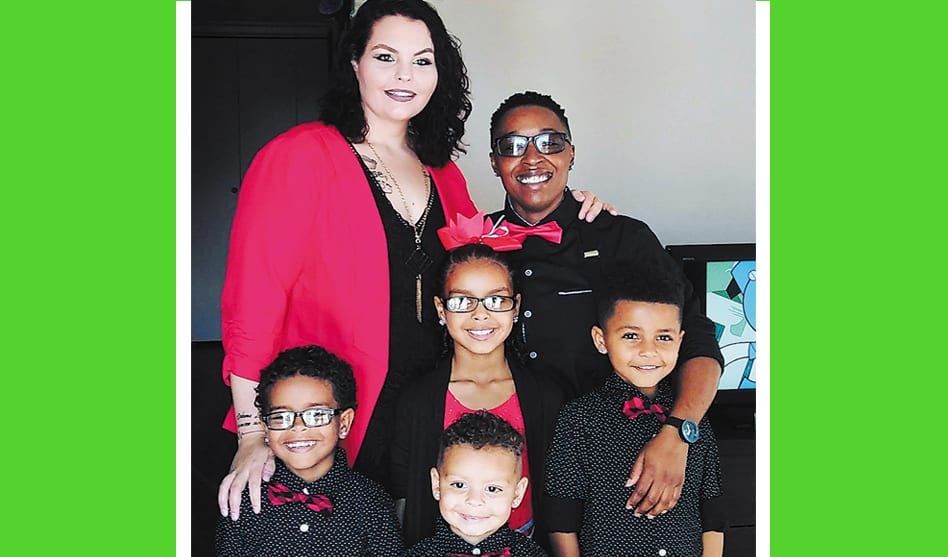Jamee Lynne and Constance Archer with their children. (Photo courtesy Jamee Archer)
H&R block responds quickly after employee refuses to prepare tax returns for married lesbian couple
DAVID TAFFET | Senior Staff Writer
taffet@dallasvoice.com
When faced recently with an employee who refused to do tax returns for a married lesbian couple, H&R Block reacted immediately: “That’s in violation of our policy and everything we stand for,” H&R Block spokesperson Susan Waldron said when contacted about the complaint. “We serve every client.”
Jamee Lynne Archer said she has been using H&R Block to file her taxes for seven years. But when she and her new wife went to the Arlington office on South Cooper Street recently to file their returns, the tax preparer refused to work with the couple.
Archer said she had an appointment with a specific H&R Block representative when she and her wife went into the office. But that representative was still working with a previous client when they arrived, so another representative, Nguyen Bui, met with them instead. But when Archer explained to him that they were married in 2017 and so they needed to file a joint return this time, she said Bui responded, “Well you guys can’t file together.”
Archer knew better: Not only could they file jointly, the law requires them to file jointly.
Before making the appointment, Archer had done her research, discovering that a married couple must file either a joint return or file as “married, filing separately,” generally the most expensive way to file taxes.
But Bui was having not of that. “Well, it is just not right,” Archer said he told them. “It [filing jointly] should only be for normal couples.”
Because Archer and her wife have children, Bui said they should file separately, with each filing as head of household. But Archer knew that wasn’t right. She knew two people can’t each deduct the same children.
Had they simply trusted his advise, she noted, the IRS could have assessed penalties against them.
H&R Block policies don’t allow such anti-LGBT discrimination. And all employees should know this, because all employess are required to sign a “Corporate Policies and Procedures Acknowledgement” page that begins, “I understand that I am expected to read and comply with the policies and procedures outlined in the Corporate Human Resources Policies and Procedures.”
Two paragraphs later is the H&R Block Corporate Anti-Discrimination and Anti-Harassment Policy, which includes the statement, “I understand that discrimination and harassment based upon legally-protected characteristics including race, color, religion, national origin, sex, pregnancy, sexual orientation, marital status, age, disability and veteran status is strictly prohibited.”
Although it’s not on the page posted on the internet, H&R Block policy also includes gender identity and expression, Waldron said.
Although Arlington has no nondiscrimination ordinances, the company’s policy also includes any additional categories covered by local law. The Dallas City Charter, for example, includes the categories in H&R Block’s policies as well as “genetic characteristics.”
Archer, a nurse, said she couldn’t imagine someone in her profession deciding they just didn’t like a patient’s sexual orientation or race or gender identity and refusing to treat that person. As unimaginable as that is, though, the Department of Health and Human Services opened a new office in its civil rights division this month that allows just that sort of discrimination to occur.
The new Conscience and Religious Freedom Division allows healthcare professionals to claim a religious exemption from helping all patients.
Doctors, nurses, paramedics and others providing healthcare and related services like hospital admissions may refuse to treat a person because that person has had an abortion in the past or is transgender, gay or lesbian, if they have religious objections. In other words, the person who refused to do his or her job can claim discrimination if he or she is fired after allowing a person needing treatment to die.
Tax law, however, has no religious exemption, according to independent CPA Alan Levi. Marital status for that year’s tax return is determined on Dec. 31, he said, and if a couple is married, there are only two ways to file.
“You file as married filing jointly or married filing separately,” Levi said. “Single head of household is not available” to a legally-married person.
H&R Block is required to file all returns electronically. Levi said if he had prepared the return with each claiming the same children, the first return would go through and the second return claiming the same child would be rejected because of the repeated social security number.
If amended tax reforms had to be filed later, the couple could be assessed a penalty if they owed more than they did on the separate returns. Any penalty would have been paid by H&R Block since it was the tax preparer who filed incorrect forms. But amending their returns resulting in additional taxes makes the couple more likely to be a target for future audits.
Tax law has no religious loopholes, Levi reiterated.
For legal reasons, Waldron said she couldn’t comment on the current employment status of the tax preparer that refused to file a joint return for the Archers. She did say, however, that the company has “taken appropriate action,” and she offered to “make it right” with the Archers.


